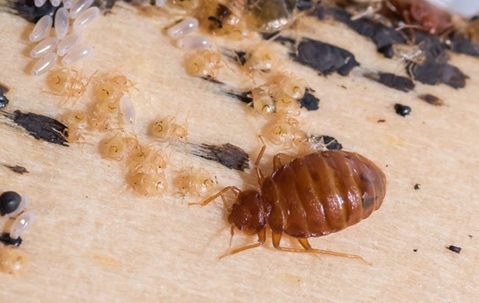Bed Bug Exterminator Houston LLC: Trusted Solutions for Bed Bug Invasions
Bed Bug Exterminator Houston LLC: Trusted Solutions for Bed Bug Invasions
Blog Article
Effective Insect Control Actions to Secure Your Yard and Plants
In the realm of horticulture, the harmony of a well-tended yard can usually be disrupted by undesirable bugs that threaten the wellness and vitality of plants. Implementing reliable parasite control determines not just safeguards the garden's aesthetic appeal yet also plays a crucial role in preserving the plants' wellness.
All-natural Insect Repellents

One more reliable all-natural bug repellent is diatomaceous planet, a grainy compound made from fossilized aquatic organisms. Diatomaceous earth jobs by literally damaging insects with its rough texture, making it an excellent option for controlling parasites like slugs, beetles, and caterpillars. Furthermore, growing buddy plants like marigolds, lavender, or basil can help ward off insects as a result of their strong scents or natural chemical substances.
Beneficial Insects for Insect Control

An additional helpful bug is the parasitic wasp, which lays its eggs inside pest bugs, eventually killing them. Ground beetles are excellent for regulating caterpillars, snails, and slugs. Hoverflies, commonly mistaken for as a result of their similar look, feed on aphids, thrips, and caterpillars.
To attract beneficial bugs to your yard, you can plant a diverse range of blooming plants, such as dill, fennel, and yarrow, which offer nectar and plant pollen for grown-up insects. Furthermore, stay clear of utilizing broad-spectrum pesticides that can damage both dangerous and advantageous bugs. By developing a welcoming setting for these beneficial bugs, you can minimize the demand for chemical pesticides and promote a much healthier, extra balanced garden environment.
Friend Planting Approaches
When intending to enhance the effectiveness of valuable pests in your garden for all-natural parasite control, considering companion planting techniques can additionally maximize the community balance. Buddy planting involves strategically positioning specific plants beside each other to optimize their mutual benefits, such as preventing bugs, bring in valuable insects, or boosting vitamins and mineral uptake - bed bug exterminator houston near me. One prominent example is growing marigolds together with tomatoes to push back nematodes and other hazardous insects while also bring in pollinators
Furthermore, including fragrant herbs like basil, mint, or rosemary in between vegetable rows can aid hinder parasites with their solid aromas. One more effective strategy is growing flowers such as sunflowers, zinnias, or cosmos to attract pollinators like and butterflies, which consequently can aid in cross-pollinating your fruit and veggie plants. Additionally, planting catch crops like nasturtiums can divert parasites far from your primary crops, acting as sacrificial plants that shield your useful produce. By carrying out companion planting techniques, you can create a varied and harmonious yard environment that naturally controls bugs while advertising like this plant health and performance.
Do It Yourself Insect Control Solutions
To effectively handle parasites in your garden, carrying out do-it-yourself bug control solutions can be an economical and eco-friendly technique. One common DIY bug control solution is creating self-made insecticidal soaps by blending mild soap with water to manage soft-bodied pests like aphids, termites, and whiteflies. Additionally, introducing advantageous pests such as ladybugs, lacewings, and predative wasps can aid normally control pest populations in your yard. Establishing physical obstacles like row covers or netting can additionally prevent insects like caterpillars from damaging your plants.
Buddy planting particular natural herbs and blossoms like marigolds, basil, and lavender can help drive away parasites and draw in advantageous pests. By incorporating these DIY parasite control services right into your gardening regimen, you can safeguard your yard and plants without depending on harsh chemicals.
Environmentally-Friendly Pesticides

Another effective alternative is diatomaceous planet, an all-natural material made from fossilized marine microorganisms, which can be sprinkled around plants to control slugs, snails, and other creeping pests. Additionally, insecticidal soaps and oils stemmed from plant-based resources serve for managing soft-bodied pests like aphids, termites, and whiteflies.
Final Thought
To conclude, efficient insect control measures such as all-natural repellents, beneficial pests, companion growing approaches, do it yourself services, and environmentally-friendly chemicals are critical for safeguarding your garden and plants. By executing these methods, you can this article protect against damages caused by pests and preserve a healthy and successful garden ecological community. navigate to this site It is crucial to consider the lasting effect of using chemicals and select even more sustainable and environmentally friendly choices to make sure the health and well-being of your plants and the environment.
Report this page